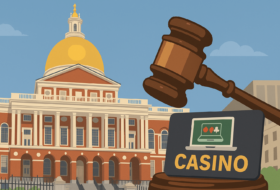
Ads are repetitive, and so is history. In 2015, sports betting wasn’t yet legal in the US. The federal government, sports league commissioners, and other power brokers had worked together to keep it that way.
Even so, Americans found themselves inundated with ads for the companies that would come to dominate that space five years later. That year, DraftKings and FanDuel spent over $200 million advertising their daily fantasy sports products.
Fast forward to the present day, and it’s the same story again, just with their sportsbooks and online casinos. They have plenty of company this time, and Americans have opinions about it. A recent survey by The Harris Poll provides some insight into those opinions.
Americans Have an Appetite for Sports Betting
Nowadays, it’s basically impossible to watch television or surf the internet without encountering some promotion or advertisement for sports betting.
What The Harris Poll found is that US adults, by and large, do not have an issue with sports betting itself.
The company surveyed a representative sample of US adults. It found that just over half (54%) of respondents have a favorable opinion of sports betting. Even more, 63% feel that it ought to be legal everywhere in the US. So, even some of those who aren’t enthusiastic about it seem to think that prohibition is a bad policy.
According to the survey, 17% of US adults reported having bet on sports in the past year. Of that group, most (71%) bet on sports at least once a week, and one in five reported that they bet on sports daily.
Of those that bet, 88% said that having some action on a sporting event increased their enjoyment of watching it, and 43% cited that as their primary motivation for betting.
Worrisome Indicators
Such enthusiasm is great for the industry. However, the poll also found some worrisome indicators when it comes to healthy gambling.
According to the survey, two-thirds of bettors said that betting on sports is more skill than luck. A similar number consider it less risky than other forms of gambling. About half said they started betting to make money.
All of these beliefs have been shown to correlate with a higher risk of developing a gambling problem.
Will the Honeymoon End?
If sports betting fuels a rise in problem gambling, the industry could eventually face a public relations crisis. Already, it’s contending with a smaller but more immediate problem caused by its own advertising.
It’s tough to say precisely where the line lies between reasonable promotion and off-putting oversaturation. However, online sports betting is fast approaching that point if it hasn’t already passed it.
Though most respondents expressed a favorable opinion of sports betting, the opposite is true regarding how the industry markets itself.
According to the same survey, three in five (58%) adults feel that sports betting shouldn’t be widely promoted through TV and internet ads and celebrity sponsorships. Even more – 71% – feel that sports leagues and teams should not be partnering with sports betting companies.
Lessons From Across the Pond
It’s been said before and will undoubtedly be reiterated in the future: the sports betting industry in the United States is on the precise path trodden in years past by its European counterparts. The UK and many continental countries have had sports betting far longer than the US and have been coping with the consequences of gambling and gambling ads.
On October 1, the UK passed a new law to curb the appeal of gambling marketing to those not yet of gambling age.
Specifically, it bans the following references from gambling ads:
- All sportspeople with considerable social media following by minors
- References to video game content and gameplay popular with minors
- Stars from reality shows popular with minors
Spain similarly requires gambling ads to be socially responsible and prohibits any suggestion that gambling can enhance a person’s well-being or lifestyle. Meanwhile, the country’s Royal Decree on Advertising bans gambling sponsorships in sports and limits televised and radio gambling ads to the hours between 1 a.m. and 4 a.m.
These seem like common sense policies. Italy, however, has taken a much harder line. Its 2018 Dignity Decree effectively placed a blanket ban on all gambling ads in the country.
Do these policies foreshadow the future of the US? Possibly. However, a hypothetical crackdown is probably several years away, at least. What seems reasonably clear, however, is that Americans are beginning to resent inescapable gambling messaging and may start to call for someone to rein the industry in if it doesn’t exercise some self-restraint.





